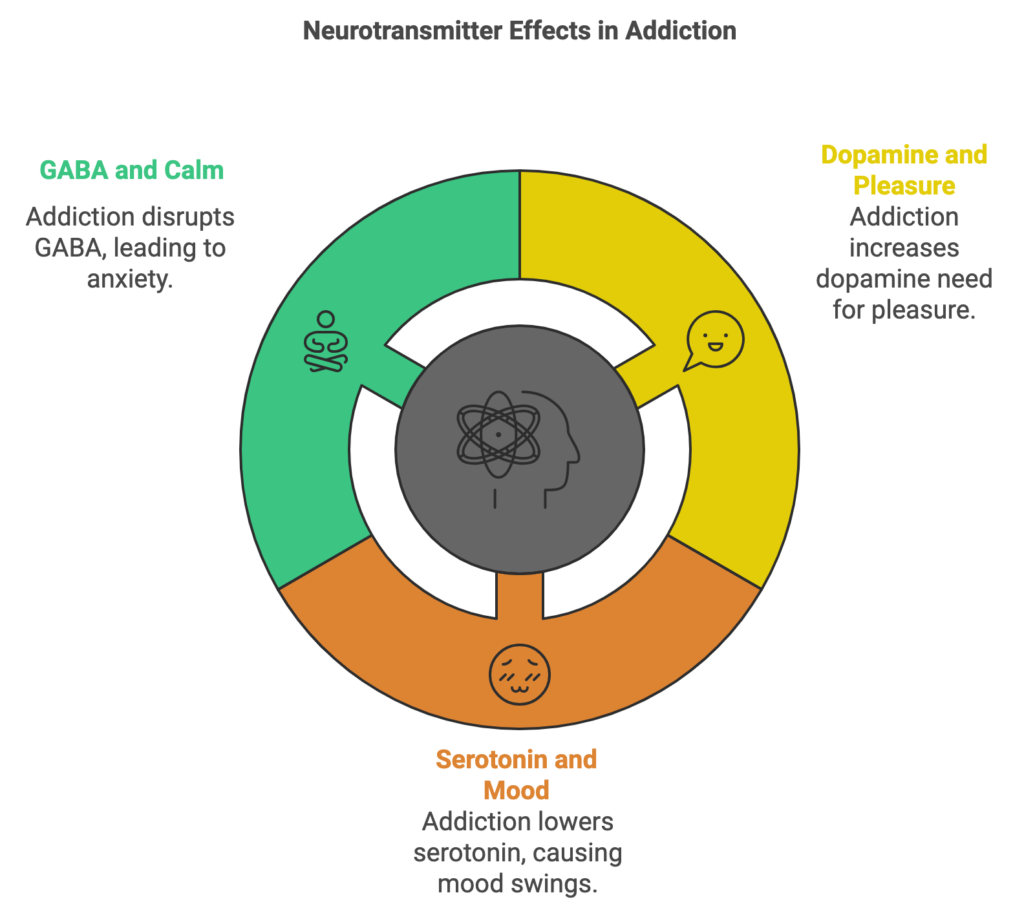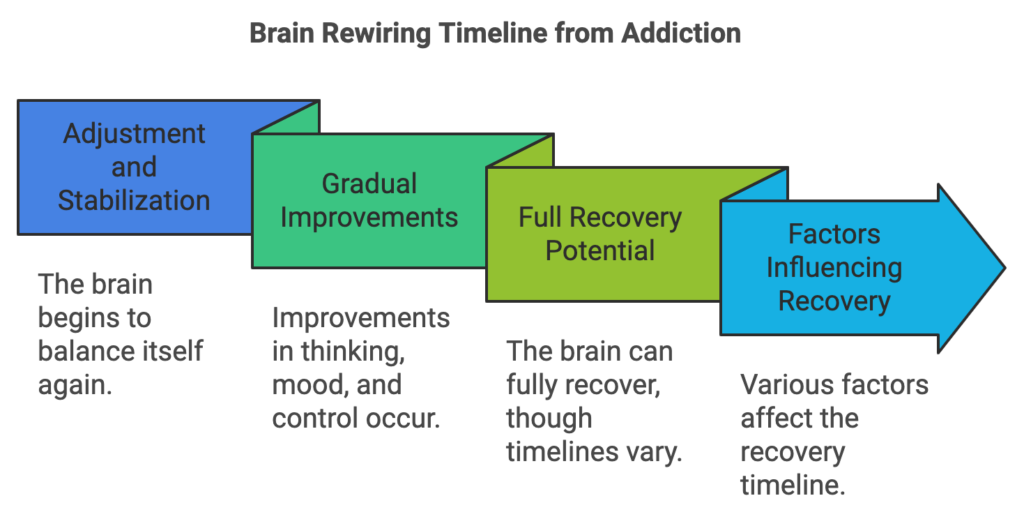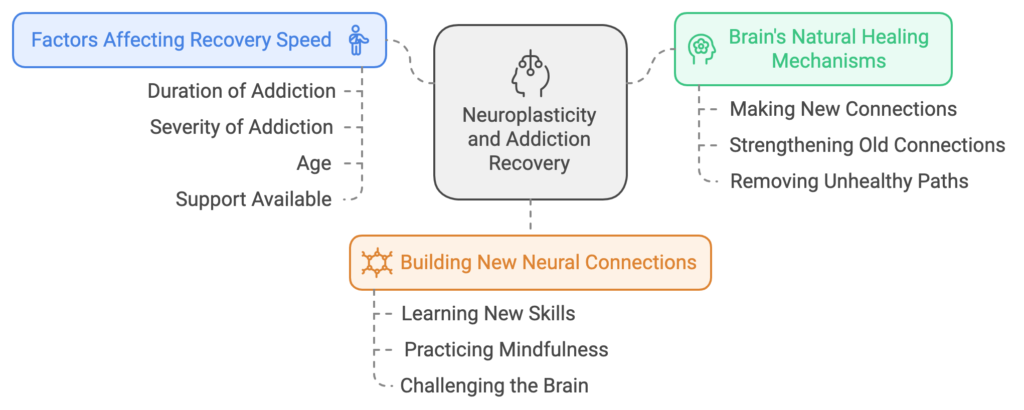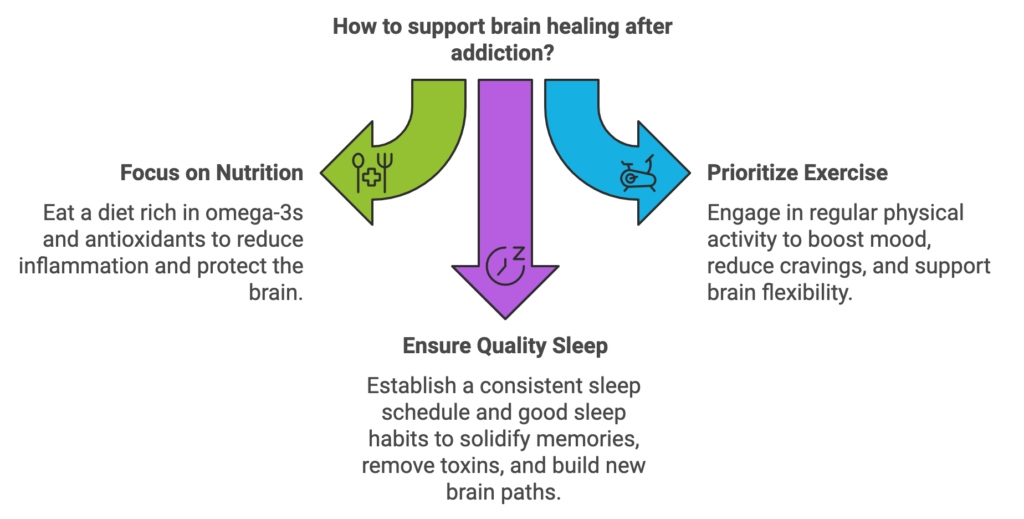Recent studies show that the human brain can change a lot, even after years of addiction. It can even break free from addiction’s hold. This guide explores how the brain recovers, including the timeline and the science behind it. It also looks at strategies for lasting healing.

Key Takeaways
- The brain can undergo significant rewiring and repairing after addiction, even after years of substance abuse.
- the brain’s capacity to create new neural connections, or neuroplasticity, is essential to the healing process.
- The timeline for brain recovery varies, but significant improvements can be seen within the first year of abstinence.
- Factors like nutrition, exercise, and sleep can profoundly influence the speed and effectiveness of brain healing.
- Long-term recovery requires a holistic strategy that takes into account mental and physical health..
Understanding Brain Changes During Addiction
Addiction changes the brain in many ways. It affects the brain’s structure and how it works. Knowing these changes is key to recovery. Let’s explore how addiction changes the brain.
Neural Pathways and Substance Dependence
Addiction takes over the brain’s reward system. It links the pleasure of substances to the brain’s decision-making. This makes it hard to stop using the substance.
How Drugs Alter Brain Chemistry
Substances like drugs mess with the brain’s chemicals. These chemicals, like dopamine and serotonin, control mood and impulse. Using drugs too much can make the brain need it to feel normal.
The Role of Neurotransmitters in Addiction

- Dopamine is key for pleasure and reward. Addiction messes with dopamine, making us need substances to feel good.
- Serotonin helps with mood and sleep. Addiction lowers serotonin, causing mood swings and cravings.
- GABA calms the brain. Addiction can upset GABA, causing anxiety and poor impulse control.
Knowing how addiction changes the brain is the first step to recovery. It helps us find the right treatments and support the brain’s healing.https://www.youtube.com/embed/iWE2nMcV7g8
| Neurotransmitter | Role in the Brain | Impact of Addiction |
|---|---|---|
| Dopamine | Reward and pleasure | Disrupts normal production and release, leading to dependence |
| Serotonin | Mood, sleep, and appetite regulation | Depletion leads to mood swings, depression, and cravings |
| GABA | Inhibitory neurotransmitter, calms the brain | Disruption leads to increased anxiety and impaired impulse control |
How Long to Rewire Brain from Addiction: Timeline Explained
Recovering from addiction takes time and effort. The time it takes to rewire your brain depends on many factors. Knowing the typical timeline helps set realistic goals.

The first step is adjustment and stabilization. Here, the brain starts to balance itself again. This can take weeks to months, based on how severe the addiction was.
Next, you’ll see gradual improvements in thinking, mood, and control. This is called neuroplasticity. It can take months to a year or more. The brain is learning to adapt without addiction.
While the brain can fully recover from addiction, the time frame varies. Things like how long you were addicted, your health, and support systems play a role. Even if the brain doesn’t go back to how it was, it can find new ways to stay sober.
The journey to rewire your brain from addiction is slow but steady. Knowing the timeline and what affects recovery helps. It lets you work with healthcare professionals to support your brain’s healing and well-being.
The Science Behind Neuroplasticity and Recovery
Addiction changes the brain a lot, affecting neural pathways and chemistry. But, the brain can change and adapt, a process called neuroplasticity. This ability is key to beating addiction.

Brain’s Natural Healing Mechanisms
The brain has natural ways to heal itself. Through neuroplasticity, it can make new connections, strengthen old ones, and remove unhealthy paths. This helps the brain get back to its healthy state.
Factors Affecting Recovery Speed
How fast the brain recovers from addiction varies. It depends on how long and severe the addiction was, the person’s age, and support available. Understanding these elements aids in determining how to rewire brain pathways after substance abuse.
Building New Neural Connections
Creating new, healthy connections is crucial in recovery. Doing things that challenge the brain, like learning new skills or practicing mindfulness, helps. This is how you improve brain function after addiction and how does neuroplasticity help in addiction recovery. It’s vital for overcoming addiction and taking back control of life.https://www.youtube.com/embed/0olq-OavJ14
Neuroplasticity gives hope to those fighting addiction. By understanding how the brain heals and what affects recovery speed, people can take action. They can rewire brain pathways after substance abuse and improve their mental and physical health.
Physical and Mental Changes During Brain Recovery

The journey to heal the brain from addiction naturally is complex. It involves both physical and mental changes. As people work to rewire their brain, they often see positive changes. These changes show the brain’s amazing ability to adapt and recover.
One key improvement is in cognitive function. The brain repairs and recalibrates its pathways. This leads to better focus, memory, and decision-making. The mind becomes clearer, making thoughts more productive and engaging.
People also see better emotional regulation. The brain manages emotions more evenly. This results in more stable moods, less anxiety, and stronger emotional resilience. This emotional balance greatly improves well-being and relationships.
As the brain heals, physical health also improves. Healing the brain from addiction naturally often means increased vitality, improved sleep, and a more robust immune system. These changes boost overall vitality and wellness.
The connection between physical and mental changes during brain recovery is clear. By rewiring the brain post-addiction naturally, people can find balance, resilience, and joy in their lives.
Natural Methods to Support Brain Healing
Rewiring the brain from addiction is a complex task. But, using natural methods can help a lot. Nutrition, exercise, and sleep are key. They help the brain adapt and heal.
Nutrition for Brain Recovery
Eating a diet rich in nutrients is vital for brain health. Foods like salmon, walnuts, and flaxseeds are full of omega-3s. They reduce inflammation and help grow new brain connections.
Fruits and vegetables high in antioxidants also protect the brain. They fight off oxidative stress, which addiction can increase.
Exercise and Physical Activity Benefits
Exercise is great for the brain’s healing. It boosts dopamine and serotonin, improving mood and reducing cravings. Yoga and tai chi are good too. They help the brain stay flexible and support recovery.
Sleep’s Role in Neural Repair
Good sleep is essential for brain healing. It helps solidify memories, remove toxins, and build new brain paths. A consistent sleep schedule and good sleep habits are key. They help the brain recover from addiction.
FAQ
How long does it take to rewire the brain from addiction?
Rewiring the brain from addiction takes time. It depends on how long you’ve been addicted, your health, and the treatment you get. Experts say it can take months to years for the brain to heal and change.
Can the brain fully recover from addiction?
Yes, the brain can heal and change through neuroplasticity. Addiction can cause lasting brain changes. But, with the right treatment and lifestyle, the brain can recover and function well again.
What are the steps to rewire the brain from addiction?
To rewire the brain from addiction, follow these steps: 1) Stop using the addictive substance. 2) Get help from therapy and medication. 3) Start healthy habits like exercise and good food. 4) Find new hobbies and ways to cope. 5) Use mindfulness and stress management.
How does neuroplasticity help in addiction recovery?
Neuroplasticity is key in recovery. It lets the brain adapt and form new connections. As you do healthier things, your brain starts to change. It weakens addiction pathways and strengthens positive ones.
What are some natural ways to improve brain function after addiction?
To help your brain heal after addiction, try these: – Eat a diet full of nutrients. – Exercise regularly to boost mood and brain health. – Get enough sleep for brain repair. – Practice mindfulness and meditation to reduce stress. – Do cognitive exercises and learn new things to build brain connections.
- How Character Defects Affect Your Life
- 3 Principles of Life: Honesty, Open Mind, Willingness
- Step 4 AA: Moral Inventory Worksheet Quick Tips

